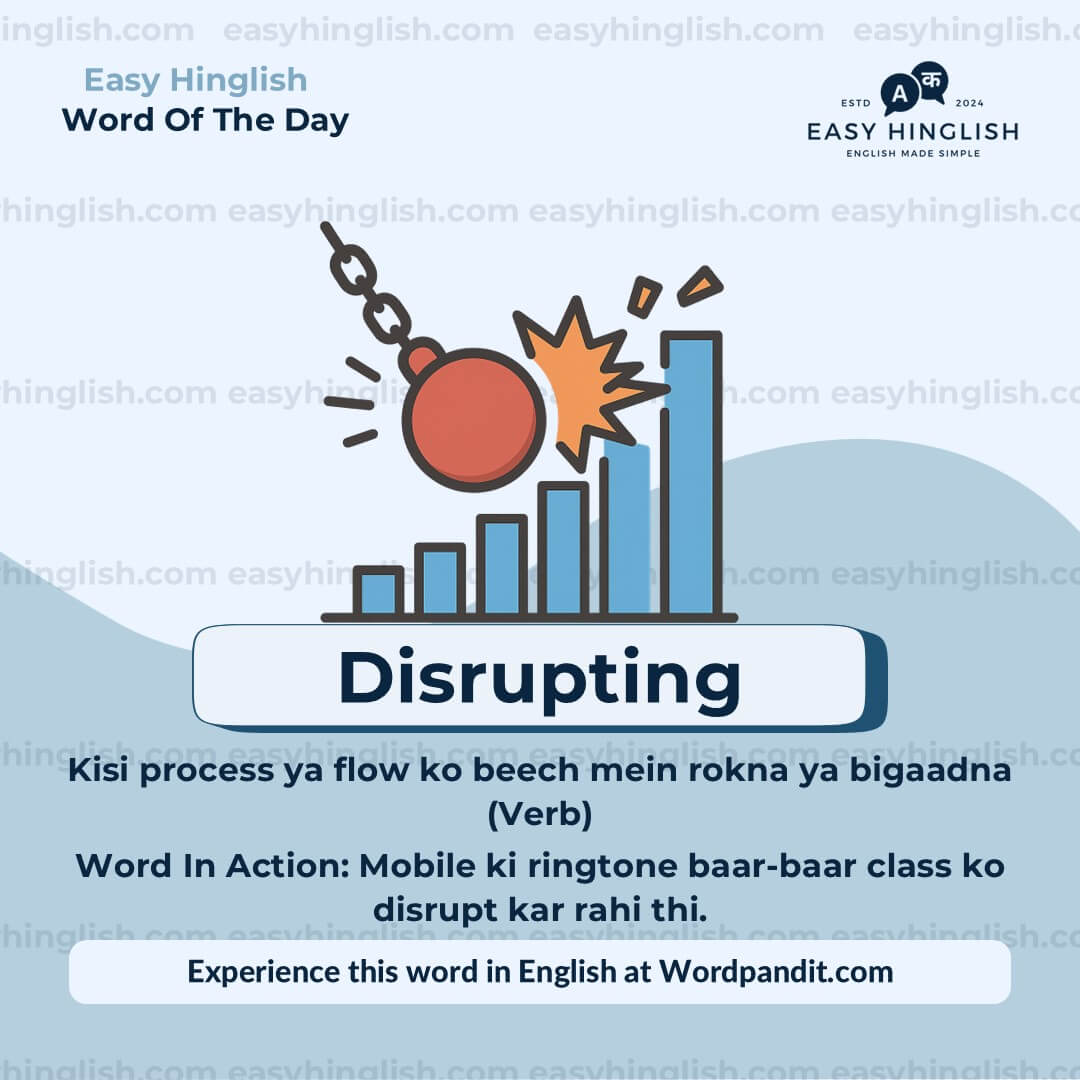Daily Vocabulary International Newspapers aur Publications se Seekho
Wordpandit ke Global Vocabulary Hub ke Saath Apni Vocabulary Expand Karo
Wordpandit par, hum aapko ek truly global vocabulary develop karne me madad karte hain, jo duniya ke sabse respected international publications se li gayi hoti hai. Yeh section aapko naye words se introduce karne ke liye design kiya gaya hai jo global conversations aur trends ko define karte hain.
Global Sources ka Power
Aapko globally sochne aur communicate karne me madad dene ke liye, hum vocabulary curate karte hain world ke top international sources se, jaise:
- The New York Times
- The Washington Post
- BBC
- The Guardian
- The Economist
- Scientific American
- Psychology Today
- Aur bhi bahut saare...
Globally Socho, Competitively Seekho
Hamare daily updates se aap international publications ke naye words seekhoge jo global news aur developments se jude hote hain. Isse aapki vocabulary current bhi rahegi aur globally relevant bhi.
Apni Global Soch Ko Expand Karo
Agar aap international exams ki tayari kar rahe ho, global business communication me excel karna chahte ho, ya sirf apni language skills improve karna chahte ho, toh Wordpandit aapko global level pe grow karne ke liye best resources provide karta hai.
Smart Learning, Global Reach
Hamari learning methodology me global examples, memory aids, aur interactive activities shamil hain, jo naye words ko effectively yaad karne aur real-world me use karne me madad karti hain.
Aaj Hi Apni Global Vocabulary Journey Shuru Karo!
Wordpandit Kyun Choose Karein?
Practical Learning: Aise words seekho jo real-world reading aur communication me aapko sach me kaam aayenge, taaki aapki comprehension aur bolne ki skills improve ho.
Diverse Content: Current affairs se lekar scientific breakthroughs tak, hamare different sources aapko multiple domains ki vocabulary seekhne ka moka dete hain.
Effortless Integration: Wordpandit ko apni daily routine ka part banao. Sirf kuch minute har din dene se aapki vocabulary time ke saath kaafi improve ho sakti hai.
Vocabulary Mastery Tak Ka Aapka Safar
- Regularly hamare Daily Vocabulary section ko visit karo
- Naye words explore karo aur unka context me use samjho
- In words ko apni writing aur bolne ki practice me use karne ki koshish karo
- Jaise-jaise aapke words badhte hain, apni progress ko track karo
Aaj Hi Apni Vocabulary Journey Shuru Karo!
Wordpandit ke saath vocabulary improve karna start karo. Roz thoda effort dalne se aap ek strong vocabulary develop kar sakte ho jo academic, professional, aur personal life me kaafi kaam aayegi.
Yaad rakho, ek naya shabd roz seekhna linguistic limitations ko door karne ka best tareeka hai! Wordpandit ko apni daily learning journey ka sathi banao aur vocabulary excellence ki taraf badho!
WORD-1: Deferring
Sandarbh (Context):
"Sabotage is about deferring our stated goals and – when we are given a shot – blowing it, or subtly hindering our chances. The puzzle is why so many of us perpetually find ourselves getting in our own way and disrupting our best-laid plans." - Aeon
Vyakhya (Explanatory Paragraph):
"Deferring" ka matlab hota hai kisi cheez ko baad mein karne ke liye tal dena. Jaise jab hum apne goals ko future ke liye postpone karte hain, chahe woh goals important hi kyun na hoon. Iska reason often hota hai self-doubt, procrastination, ya fear. Yeh word humare hesitation aur delay ko reflect karta hai.
Arth (Meaning): Kisi kaam ko baad mein talna ya postpone karna (Verb)
Uccharan (Pronunciation): dih-FUR-ing
Kathinai Star (Difficulty Level): ⭐⭐ Beginner to Intermediate
Utpatti (Etymology): Latin word *differre* se aaya hai, jiska matlab hota hai "delay karna ya talna"
Prashant Sir Ke Tathya (Prashant Sir's Notes):
“Deferring” ka istemal academics, offices, aur personal life mein hota hai—log exams ko defer karte hain, decisions ko talte hain, ya emotional responses ko bhi delay kar dete hain. Yeh word subtly show karta hai ki hum kab avoid kar rahe hain ya excuses bana rahe hain.
Samanarthi & Vipritarthi (Synonyms & Antonyms):
Samanarthi (Synonyms): postpone, delay, put off, stall, suspend
Vipritarthi (Antonyms): advance, expedite, hasten, continue, proceed
Udaharan (Usage Examples):
- Usne apna job application baar-baar defer kiya, jab tak deadline nikal gayi.
- Board ne budget cut ka decision agle mahine tak defer kar diya.
- Woh apna world tour ka sapna defer kar raha tha family responsibilities ki wajah se.
- Bar-bar apne goals ko defer karke hum khud apne raste ka obstacle ban jaate hain.
Sanskritik Sandarbh (Cultural Reference):
"Agar kisi goal ka timeline nahi hai, toh woh sirf ek sapna hai — deferring action success ko door karta hai." - Tony Robbins ke motivational talks se prerit
Sochiye (Think About It):
Kaunsa aisa important goal hai jo aap deferring kar rahe ho? Kya wajah hai us delay ki?
Chhoti Kriya (Quick Activity):
Is hafte ke 3 kaam likho jo aap ne defer kiye hain. Aaj unmein se ek kaam khatam karne ka samay fix karo.
Yaad Karne Ka Tarika (Memory Tip):
Socho: “Deferring = Delaying Decisions” — dono 'D' se start hote hain aur kaam talne se jude hain.
Vastavik Jeevan Me Upyog (Real-World Application):
Real life mein deferring tab dikhta hai jab hum apni career choices, tough conversations ya personal goals ko baar-baar postpone karte hain. Jab humein samajh aata hai ki hum defer kyun kar rahe hain, tabhi hum timely action le sakte hain.
WORD-2: Disrupting
Sandarbh (Context):
"Sabotage is about deferring our stated goals and – when we are given a shot – blowing it, or subtly hindering our chances. The puzzle is why so many of us perpetually find ourselves getting in our own way and disrupting our best-laid plans." - Aeon
Vyakhya (Explanatory Paragraph):
"Disrupting" ka matlab hota hai kisi normal flow ya system ko todna ya usme badha daalna. Upar diye context mein, yeh word dikhata hai kaise hum khud apni progress ko rok dete hain—chahe woh negative soch ho, procrastination ho, ya khud galat decisions lena ho. Yeh word is baat ko highlight karta hai ki kabhi-kabhi hamari internal problems bhi bahar ki problems jitni hi harmful hoti hain.
Arth (Meaning): Kisi process ya flow ko beech mein rokna ya bigaadna (Verb)
Uccharan (Pronunciation): dis-RUPT-ing
Kathinai Star (Difficulty Level): ⭐⭐ Beginner to Intermediate
Utpatti (Etymology): Latin word *disrumpere* se nikla hai, jiska arth hai “todna ya alag kar dena”
Prashant Sir Ke Tathya (Prashant Sir's Notes):
“Disrupting” ek strong word hai—kabhi negative hota hai (jaise kisi plan ko beech mein todna), aur kabhi positive bhi (jaise business mein “disruptive innovation”). Context samajhna bahut zaroori hota hai jab yeh word use ho raha ho.
Samanarthi & Vipritarthi (Synonyms & Antonyms):
Samanarthi (Synonyms): interrupt, interfere with, disturb, derail, unsettle
Vipritarthi (Antonyms): continue, maintain, sustain, preserve, stabilize
Udaharan (Usage Examples):
- Achanak power cut ne poore din ka schedule disrupt kar diya.
- Woh baar-baar meeting disrupt kar raha tha apne irrelevant comments se.
- Negative thoughts aksar humare mental clarity ko disrupt kar dete hain.
- Smartphones ka aana traditional media industries ko disrupt kar raha hai.
Sanskritik Sandarbh (Cultural Reference):
“Silicon Valley mein disruption ek naya norm ban gaya hai, jahan startups pura industry model badal dete hain.” - Tech journalism ka ek common theme
Sochiye (Think About It):
Kya aap bhi apne daily routine ya progress ko bina jaane disrupt kar rahe hain?
Chhoti Kriya (Quick Activity):
Tin aisi aadatein likho jo aapke focus ko disrupt karti hain. Unmein se ek ko kam karne ke liye ek chhoti si change plan karo.
Yaad Karne Ka Tarika (Memory Tip):
Socho: “Disrupt = Disturb + Rupture” — matlab system ko todna ya hila dena.
Vastavik Jeevan Me Upyog (Real-World Application):
"Disrupting" ka use personal aur professional dono settings mein hota hai. Apni productivity ko disrupt hone se bachana personal success ke liye important hai. Wahi companies disruptive ideas se market ko change karti hain.
WORD-3: Evocation
Sandarbh (Context):
"The vivid sculpture might in fact do more to inspire visitors to further learn about the war, and ultimately the horror of all wars." - Aeon
Vyakhya (Explanatory Paragraph):
"Evocation" ka matlab hota hai kisi feeling, yaad ya tasveer ko dimag mein laana—especially jab woh kisi emotional ya artistic source se trigger hoti ho. Upar wale example mein, sculpture logon ke mann mein war ki horrors ko evoke karta hai, chahe unhone kabhi war dekha ho ya nahi. Yeh word dikhata hai ki kaise art ya music humein deeply touch kar sakte hain bina directly kuch kehne ke.
Arth (Meaning): Kisi bhavna, yaad, ya chhavi ko manasik roop se jagana (Noun)
Uccharan (Pronunciation): eh-vo-KAY-shun
Kathinai Star (Difficulty Level): ⭐⭐⭐ Intermediate
Utpatti (Etymology): Latin shabd *evocatio* se aaya hai, jo *evocare* se bana hai—iska arth hai "bulana ya jagana"
Prashant Sir Ke Tathya (Prashant Sir's Notes):
"Evocation" ka use mostly art, literature aur emotional situations mein hota hai. Jab koi cheez humein bina directly kehkar koi strong emotion mehsoos karwaati hai, toh woh evocation ka kaam kar rahi hoti hai. Yeh ek subtle aur soulful shabd hai.
Samanarthi & Vipritarthi (Synonyms & Antonyms):
Samanarthi (Synonyms): remembrance, invocation, recollection, impression
Vipritarthi (Antonyms): repression, forgetting, suppression, disregard
Udaharan (Usage Examples):
- Us novel ne bachpan ki yaadon ka aisa evocation kiya ki kai readers ro padhe.
- Woh painting ek khoi hui mohabbat ka emotional evocation thi.
- Unka speech ek national pride ka powerful evocation tha.
- Music mein woh taqat hoti hai jo turant purani yaadein evoke kar deta hai.
Sanskritik Sandarbh (Cultural Reference):
"Cinema jab apne best par hota hai, toh woh sirf kahani nahi batata—woh ek evocation hota hai. Jo mehsoos karwata hai, jo shabdon se kehna mushkil ho." - Andrei Tarkovsky ke cinema philosophy se prerit
Sochiye (Think About It):
Kya aapne kabhi kisi gaane, tasveer ya kitaab ke zariye koi strong emotion ya yaad mehsoos ki hai? Kya tha woh moment?
Chhoti Kriya (Quick Activity):
Apni gallery se ek purani photo dekho ya ek purana song suno. Teen emotions ya yaadein likho jo us evocation se ubhri hoon.
Yaad Karne Ka Tarika (Memory Tip):
"Evocation" = “Evoke Emotion” — yaani kisi cheez se feeling ya yaad jagana.
Vastavik Jeevan Me Upyog (Real-World Application):
"Evocation" ka use art reviews, literature analysis, aur psychological discussions mein hota hai—jaise koi poem ya perfume ek purani yaad ko evoke karta hai, ya koi speech ek jazba jagata hai.
WORD-4: Collate
Sandarbh (Context):
"He took me on a dizzying screen-share tour of software he’s designed to collate the existing research on procrastination (including fMRI studies that observe the process in the brain) in order to identify underlying patterns." - Aeon
Vyakhya (Explanatory Paragraph):
"Collate" ka matlab hota hai alag-alag sources se information collect karna aur usse systematic tareeke se arrange karna. Jaise upar wale context mein ek software use ho raha hai jo procrastination ke upar kai research studies ko collate karta hai, taaki patterns dikh sakein. Yeh word research, report-writing, aur data analysis mein bahut useful hota hai jab hume clarity aur structure chahiye hoti hai.
Arth (Meaning): Information ya documents ko systematically ikattha karna aur arrange karna (Verb)
Uccharan (Pronunciation): kuh-LATE
Kathinai Star (Difficulty Level): ⭐⭐ Beginner to Intermediate
Utpatti (Etymology): Latin shabd *collātus* se aaya hai, jo *conferre* ka past participle hai—iska matlab hai "saath lana ya ikattha karna"
Prashant Sir Ke Tathya (Prashant Sir's Notes):
"Collate" ek aisa shabd hai jo academics aur office world mein kaafi important hai. Sochiye aapke paas bohot saari info hai—jab tak aap usse collate nahi karenge, tab tak woh sirf clutter hai. Collating helps make sense out of information overload.
Samanarthi & Vipritarthi (Synonyms & Antonyms):
Samanarthi (Synonyms): compile, organize, assemble, gather, sort
Vipritarthi (Antonyms): scatter, disorganize, disperse, separate
Udaharan (Usage Examples):
- Assistant ne saare reports ko collate karke ek single document bana diya.
- Librarian climate change ke articles ko alag journals se collate kar rahi hai.
- Research publish karne se pehle, notes aur citations ko collate karna zaroori hai.
- Humne survey ke responses ko charts mein convert karne ke liye software se collate kiya.
Sanskritik Sandarbh (Cultural Reference):
Academics aur journalism mein, collating sources ek critical step hota hai. Jaise investigative reporters multiple sources ko collate karke sach ka pata lagate hain—The New Yorker ya The Economist jaisi publications mein yeh daily practice hoti hai.
Sochiye (Think About It):
Jab har taraf information ka overload hai, toh kya collate karna aapko ek better thinker aur communicator bana sakta hai?
Chhoti Kriya (Quick Activity):
Apne favorite topic (jaise AI ya climate change) par 3 reliable articles dhoondho. Ab inka main idea ek paragraph mein collate karke likho.
Yaad Karne Ka Tarika (Memory Tip):
Collate = “Collect + Relate” — matlab info ikattha karke ek meaningful form mein arrange karna.
Vastavik Jeevan Me Upyog (Real-World Application):
"Collate" ka use har jagah hota hai—academics, project reports, office meetings, aur even vacation planning mein bhi. Jab aap collate karte ho, tab aap smart aur informed decision le sakte ho.
WORD-5: Proactive
Sandarbh (Context):
"It is about noticing taken-for-granted social designs and erecting creative defences against powers and arrangements that chip away at one’s ability to exercise self-ownership." - Aeon
Vyakhya (Explanatory Paragraph):
"Proactive" aise vyakti ko describe karta hai jo problems aane se pehle hi action le leta hai. Matlab, woh cheeze anticipate karta hai aur unke liye pehle se prepare karta hai. Is context mein, proactive hone ka matlab hai harmful social systems ko pehle se samajhna aur unke against mental ya behavioral defences tayar karna, taaki apni autonomy bachi rahe.
Arth (Meaning): Kisi situation ke hone se pehle hi action lena (Adjective)
Uccharan (Pronunciation): pro-AK-tiv
Kathinai Star (Difficulty Level): ⭐⭐ Beginner to Intermediate
Utpatti (Etymology): “Pro-” (aage) + “active” ka combination—20th century mein coin hua
Prashant Sir Ke Tathya (Prashant Sir's Notes):
"Proactive" ka opposite hota hai "reactive". Proactive mindset leadership aur personal growth ke liye bahut zaroori hai. Exam ki tayari, career planning ya relationships—har area mein proactive rehne wale log usually zyada successful hote hain.
Samanarthi & Vipritarthi (Synonyms & Antonyms):
Samanarthi (Synonyms): forward-thinking, anticipatory, enterprising, preemptive, prepared
Vipritarthi (Antonyms): reactive, passive, indifferent, unprepared, neglectful
Udaharan (Usage Examples):
- Usne apni health ko manage karne ke liye proactive approach li—daily exercise aur mindful eating.
- Proactive students exam ke liye weeks pehle se padhai start karte hain, last minute nahi.
- Company ne cybersecurity threats se bachne ke liye proactive steps liye.
- Mental health ke case mein proactive hone ka matlab hai stress ko pehle hi pehchanna aur handle karna.
Sanskritik Sandarbh (Cultural Reference):
"Be Proactive" Stephen Covey ki famous kitab *The 7 Habits of Highly Effective People* ka pehla habit hai—yeh sikhaata hai ki humein apne responses aur actions ke liye responsibility leni chahiye.
Sochiye (Think About It):
Aapke life ke kaunse area mein agar aap proactive ho jaayein, toh kaafi positive change aa sakta hai?
Chhoti Kriya (Quick Activity):
Ek situation likhiye jahan aap react karte aaye hain. Ab usi ke liye do proactive steps sochiye jo aap is week le sakte hain.
Yaad Karne Ka Tarika (Memory Tip):
Proactive = “Acting in advance” — jaise baarish se pehle umbrella tayar rakhna.
Vastavik Jeevan Me Upyog (Real-World Application):
Workplace mein proactive hone ka matlab hota hai boss ko bataane se pehle hi problem solve kar lena. Personal life mein proactive hona matlab pehle se planning karna—jaise budget banana ya kisi friend se pehle hi connect ho jaana jab woh down feel kar raha ho.













